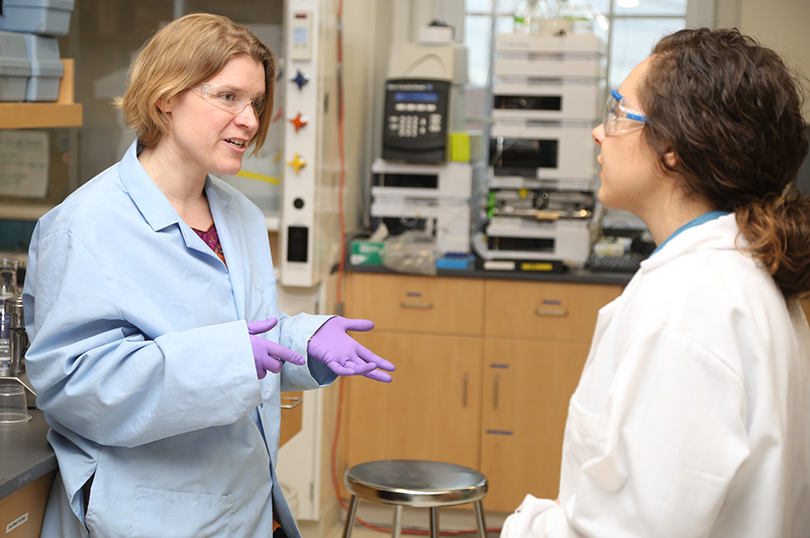Lantagne publications on public health interventions

Associate Professor Daniele Lantagne and the Lantagne Group study the effects of efforts to improve sanitation and water hygiene in emergencies and in low-income environments. Population-level policies and efforts put in place by public health interventions like the ones studied by the Lantagne Group are essential to promoting public health, especially as countries and public health agencies across the globe struggle to contain the COVID-19 pandemic.
The Lantagne Group and colleagues published 16 papers in peer-reviewed journals over the past year, covering research from locations including India, Uganda, Myanmar, Fiji, Vanuatu, and Nicaragua, and on public health crises like cholera, typhoid fever, and SARS-CoV-19.
In PLOS Neglected Tropical Diseases, Lantagne and four co-authors – Tufts alumni Karin Gallandat, Annie Huang, Justine Rayner, and postdoctoral scholar Gabrielle String – evaluated the effectiveness of three household spraying programs during cholera outbreaks in the Democratic Republic of the Congo and Haiti. The authors issued a series of best practice recommendations, including that spraying agents should arrive quickly and hygiene promotion activities should be instituted at the same time.
In research published in Environmental Science & Technology, Lantagne and PhD students Mustafa Sikder, Patrick Mirindi, and String studied water trucking, which is commonly utilized as a water supply intervention during humanitarian efforts but is under-researched. The Tufts researchers conducted evaluations of water trucking programs in Bangladesh and the Democratic Republic of the Congo. They found that the programs were appreciated by users and they issued recommendations that could help achieve the consistent delivery, improved quality, and increased quantity that users wanted.
The Lantagne Group also turned its expertise toward the COVID-19 pandemic. Lantagne, postdoctoral scholar and alumna String, and a team of undergraduates – juniors Noah Bedrosian, Elizabeth Mitchell, Elsa Rohm, and Miguel Rothe, and sophomore Christine Kelly – conducted a review of hygiene intervention effectiveness against SARS-CoV-2, the virus that causes COVID-19. Among other conclusions published in Environmental Science & Technology, the researchers concluded that there is a need for more research on hygiene interventions other than surfaces, especially handwashing. The team also reviewed mask disinfection and re-use practices for SARS-CoV-2 – ultimately recommending a focus on the use of hydrogen peroxide, heat, and ultraviolet germicidal irradiation for the disinfection and re-use of N95 masks.
Learn more about the Lantagne Group's recent work:
- “A Systematic Review of Surface Contamination, Stability, and Disinfection Data on SARS-CoV-2 (through July 10, 2020),” published in Environmental Science & Technology
- “A systematic review of mask disinfection and reuse for SARS-CoV-2 (through July 10, 2020),” preprint
- “Efficacy of locally-available cleaning methods and household chlorination at inhibiting biofilm development in jerricans used to store household drinking water,” published in Environmental Science: Water Research & Technology
- “Laboratory efficacy of surface disinfection using chlorine against Vibrio cholerae,” published in Journal of Water and Health
- “Impact Evaluation of an SMS Campaign to Promote Household Chlorination in Rural Haiti,” published in Water
- “Temporal analysis of water, sanitation, and hygiene data from knowledge, attitudes, and practices surveys in the protracted humanitarian crisis,” published in Journal of Water, Sanitation & Hygiene for Development
- “Highly targeted spatiotemporal interventions against cholera epidemics, 2000–19: a scoping review,” published in The Lancet Infectious Diseases
- “Associations among Water, Sanitation, and Hygiene, and Food Exposures and Typhoid Fever in Case–Control Studies: A Systematic Review and Meta-Analysis,” published in The American Journal of Tropical Medicine and Hygiene
- “Maintenance practices and water quality from rainwater harvesting in south-west Uganda,” published in Journal of Water, Sanitation and Hygiene for Development
- “Household spraying in cholera outbreaks: Insights from three exploratory, mixed-methods field effectiveness evaluations,” published in PLOS Neglected Tropical Diseases
- “Evidence summary of WASH coordination in humanitarian response,” published in Disasters
- “Evaluation of consistent use, barriers to use, and microbiological effectiveness of three prototype household water treatment technologies in Haiti, Kenya, and Nicaragua,” published in Science of The Total Environment
- “A systematic review of chlorine-based surface disinfection efficacy to inform recommendations for low-resource outbreak settings,” published in American Journal of Infection Control
- “Effectiveness of water chlorination programs along the emergency-transition-post-emergency continuum: Evaluations of bucket, in-line, and piped water chlorination programs in Cox’s Bazar,” published in Water Research
- “Efficacy of locally-available cleaning methods in removing biofilms from taps and surfaces of household water storage containers,” published in npj Clean Water
- “Delivering Drinking Water by Truck in Humanitarian Contexts: Results from Mixed-Methods Evaluations in the Democratic Republic of the Congo and Bangladesh,” published in Environmental Science & Technology
- “Operational research on rural, community-managed Water Safety Plans: case study results from implementations in India, DRC, Fiji, and Vanuatu,” published in Water Research
Department:
Civil and Environmental Engineering